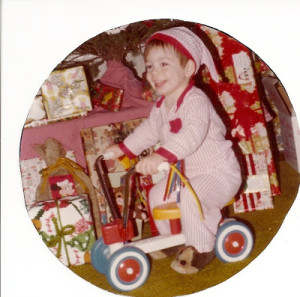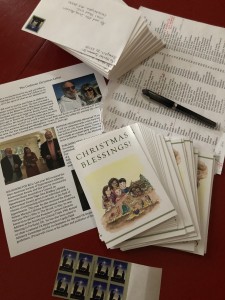 For the first seven or so years of our marriage, my husband and I did not celebrate Christmas. As I write these words, I’m surprised that we rejected such an enduring tradition from our lives for so long. We were part of a cult-like group that didn’t believe in Christmas. We interpreted a scripture verse to mean don’t celebrate any holidays:
For the first seven or so years of our marriage, my husband and I did not celebrate Christmas. As I write these words, I’m surprised that we rejected such an enduring tradition from our lives for so long. We were part of a cult-like group that didn’t believe in Christmas. We interpreted a scripture verse to mean don’t celebrate any holidays:
“One person esteems one day above another; another esteems every day alike. Let each be fully convinced in his own mind. He who observes the day, observes it to the Lord, and he who does not observe the day, to the Lord he does not observe it.”—Romans 14:5-6 (Orthodox Study Bible)
We weren’t the first people to reject the celebration of Christmas—the Jehovah’s Witnesses had been doing it for many years. But most of the folks in our little group were raised in Christian families and churches in the South, and it was difficult for our families when we chose not to participate. I can still remember how much it hurt to tell our parents that we wouldn’t be giving them gifts and that we ask that they not give us gifts. For so many years our home was not aglow with Christmas lights and enriched with the aroma of pine needles from Christmas trees. A few Christmas cards did arrive in our mailbox, but even those teetered off when we didn’t reply.

And then somehow—I can’t remember this part of the story—we changed our minds. I do remember when it happened, because our oldest child was just over a year old. Thankfully he didn’t have to endure years without Christmas, since he was only four months old during the first Christmas season of his life, when we still weren’t participating. I can still remember the joy I felt at seeing his joy—first at the Christmas tree in our home, and then at the gifts, and the sounds and smells of Christmas as we walked through stores and drove through neighborhoods to look at the outdoor Christmas lights.
 I love going to stores that are decorated for Christmas. Especially the small stores, like Burke’s Books, where the window decorations are always so creative. As I left with my bundle of books to give as Christmas gifts, I paused in front of the store and sang (yes—and I didn’t care if anyone walked by and heard me) a few verses of “Silver Bells”—especially the part that says, “City sidewalks, busy sidewalks, dressed in holiday style . . . . As the shoppers rush home with their treasures.”
I love going to stores that are decorated for Christmas. Especially the small stores, like Burke’s Books, where the window decorations are always so creative. As I left with my bundle of books to give as Christmas gifts, I paused in front of the store and sang (yes—and I didn’t care if anyone walked by and heard me) a few verses of “Silver Bells”—especially the part that says, “City sidewalks, busy sidewalks, dressed in holiday style . . . . As the shoppers rush home with their treasures.”
Yes, the music! I had missed singing Christmas carols—and actually I still miss this, since traditional American Christmas music isn’t sung in the Orthodox Church. It’s not that we’re against it—it’s just that those carols aren’t liturgical, and so they aren’t part of our worship. Some of our parishioners do go as a group to sing carols at a local nursing home every year, and some traditional Christmas carols are sung in our church’s annual children’s Christmas play. But being part of the Orthodox Church is still a bit “foreign” to one born and raised in Mississippi, and living for the past thirty years in Memphis. Some Orthodox traditions run counter to our culture.
Like the Nativity fast, which lasts from November 15 until Christmas. This period is similar to the forty days of Lent that lead up to Pascha, the Orthodox celebration of Easter, only a little less strict. We fast from meat, dairy, and even fish and wine on many days. What’s hard about this—especially as compared with the season of Great Lent—is that the rest of our culture is celebrating with delicious food and drink during this time. Everyone else is partying before Christmas (my husband and I are invited to three Christmas parties this year, and look forward to all of them), whereas our church encourages us to begin the celebrations on Christmas, with emphasis on the “twelve days of Christmas” that start with Christmas, rather than ending with it.
I find some of our traditions distract from the season. Like when we celebrate the Feast of Saint Nicholas on December 6. We have Vespers, then our teens put on a play about the real Saint Nicholas, Bishop of Myra. Parishioners bring toys, which our church gives to a local Christmas “store” for parents who can’t afford to buy gifts for their children. And we share refreshments—candies and cookies that contain no milk, eggs, or cheese. No hot chocolate. No egg nog. These must wait until Christmas Day and after. So it always feels to me a bit like a semi-feast.
 I don’t mean to sound like Scrooge, but I obviously struggle with some of the traditions of my Church. Especially when they seem to tamp down the joy and excitement that I missed during those years when we rejected Christmas altogether. This year I’m trying to be positive and focus on giving to others, prayer, and taking time for silence and inner peace. One way I’m doing that is by incorporating prayer into one of my favorite traditions—writing, addressing, and mailing Christmas cards. As I address each card and write a short note inside, I say a prayer for the person or people who will be receiving the card. Since I send out over 100 cards, this is an opportunity for quite a bit of prayer. And just for fun, last night I counted up the states where our Christmas card recipients live, and found there are 22. It’s fun to think of those friends and family who live everywhere from Florida to the state of Washington, and from southern California to Maine, all receiving our cards, and our prayers.
I don’t mean to sound like Scrooge, but I obviously struggle with some of the traditions of my Church. Especially when they seem to tamp down the joy and excitement that I missed during those years when we rejected Christmas altogether. This year I’m trying to be positive and focus on giving to others, prayer, and taking time for silence and inner peace. One way I’m doing that is by incorporating prayer into one of my favorite traditions—writing, addressing, and mailing Christmas cards. As I address each card and write a short note inside, I say a prayer for the person or people who will be receiving the card. Since I send out over 100 cards, this is an opportunity for quite a bit of prayer. And just for fun, last night I counted up the states where our Christmas card recipients live, and found there are 22. It’s fun to think of those friends and family who live everywhere from Florida to the state of Washington, and from southern California to Maine, all receiving our cards, and our prayers.
‘Tis the season, y’all.